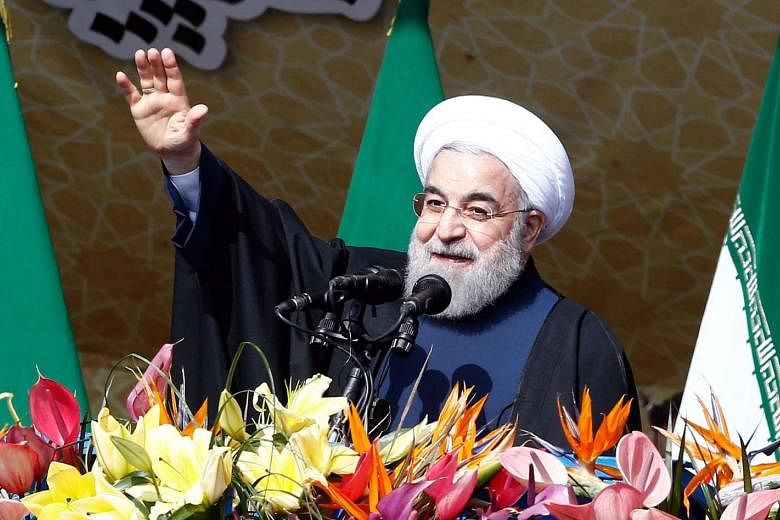ANKARA (Reuters) - Iran's President Hassan Rouhani urged the country's faction-ridden elite on Thursday (Feb 11) to seek consensus after a hardline watchdog body disqualified thousands of moderate candidates from two elections this month, state television said.
Mr Rouhani, a popular pragmatist now reestablishing ties abroad after last year's nuclear accord with global powers ended economic sanctions, spoke to crowds in Azadi Square in Teheran marking the anniversary of Iran's 1979 Islamic Revolution.
The anniversary came amid intense infighting after the powerful Guardian Council barred the moderate candidates from running for parliament and the Assembly of Experts, which will choose the country's next supreme leader.
State television said millions turned out nationwide at revolution rallies in all main cities marked by the traditional anti-United States and anti-Israel slogans and burnings of those two countries' flags.
"Political factions should put aside any confrontation ... we need consensus now," Mr Rouhani told the Teheran crowd. "Don't turn your backs on the ballot boxes."
Mr Rouhani also defended the nuclear deal, which hardliners oppose as a concession to pressure from Washington. He said it protected the Islamic Republic's rights to nuclear power and strengthened the country's international and regional position.
"Iranians will never yield to any pressure," he said. "Our nuclear victory showed to the world that Iranians are capable of winning any battle, including diplomatic battles."
Iran emerged last month from years of isolation when crippling economic sanctions were lifted in return for Tehran complying with the nuclear deal to curb its nuclear ambitions.
It is holding elections on Feb 26 for the 290-seat Parliament and the 88-seat Assembly of Experts.
Moderates have criticised the Guardian Council, a clerical body that oversees all elections, for barring thousands of their candidates who might have enjoyed support at the polls because of Mr Rouhani's success in lifting sanctions.
Among those barred from running was Mr Hassan Khomeini, 43, a grandson of the late Ayatollah Ruhollah Khomeini, who led the revolution that overthrew the US-backed Shah Mohammad Reza Pahlavi and created Iran's Islamic Republic.
The council said Mr Hassan Khomeini "does not have enough Islamic knowledge to help designate the next supreme leader" as a member of the Assembly of Experts, according to Iranian media.

